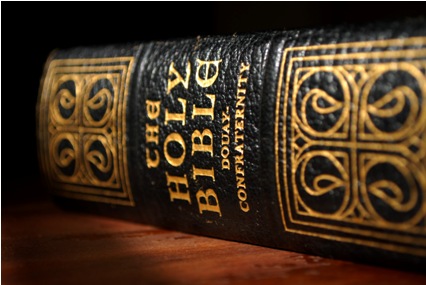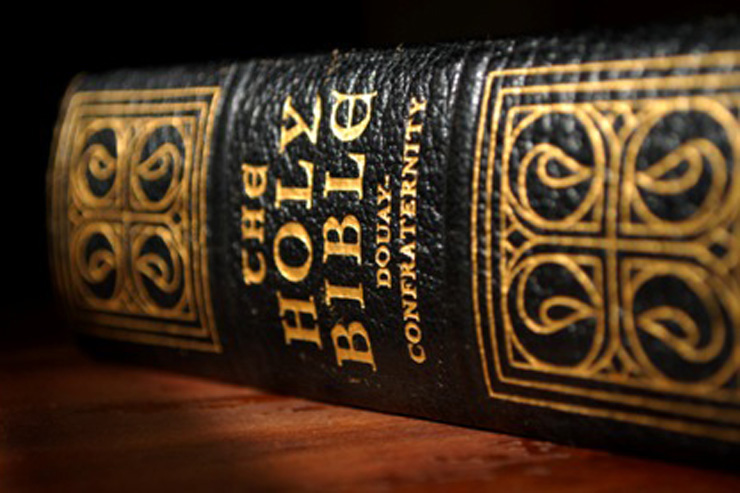Editor’s Note: Reflection on the Mass readings for the 5th Sunday of Easter (Year A); Acts 6:1-7; Psalms 33:1-2, 4-5, 18-19; First Peter 2:4-9; John 14:1-12

Christ the Consolator by Bloch
I am the Way, the Truth, and the Life
“What does Jesus Christ mean when he says this John 14:1-12? Are there not many paths to God, many truths? As long as you believe in God and try to be a good person, it doesn’t matter what religion you belong to. There are different paths up the mountain, but they all lead to the summit.”
How many times have you heard people say such things? It’s politically correct. Tolerant. Reasonable.
But Jesus says it’s wrong! “I am the way, the truth and the life. No one comes to the Father but by me.”
The highway to heaven had been closed for centuries. God did not set up the road block. We did. But the barriers that we erected were immovable. At least by us. God was the only one who could open the way.
There was a problem with truth and life as well. Oh, people had some ideas about God. But the ideas were shadowy and fragmentary and mixed with distortions. Everyone in the ancient world knew the divine had created the universe and that worship was a duty. But some thought homage required human sacrifice. And most thought that there were many gods. A few, like Aristotle, realized that there could only be one God, but imagined this God to be remote and aloof from human affairs.
Finally there was the issue of life, divine life. Even those possessing the most truth about God, the Jews, had a problem here. They knew what God required, but even the best among them lacked the power to do it. Take David for instance. When the chips were down, he proved defenseless against the power of lust, deceit, and even murder.
Jesus is the way. Indeed he is a two way street. In him, God comes to meet us, holding back, offering everything of who he is and what he has. Through Him and Him alone, we have access to God to such a degree that we can now call him Abba, Father.
Jesus is the truth. Not just some truth but the entire truth. He is God’s definitive and perfect Word expressing who God is, what He’s like, who we are, and what we need to do to be saved from misery and futility.
And Jesus is the life. He gives us not only commandments and noble ideals, but also the power to live them out, the power to become new people. That Power is the Lord and Giver of Life Himself, the Holy Spirit, who Jesus pours out on those who accept Him.
So there is only one Way, one Truth, one Life, one Priest who offers a perfect sacrifice for sins. So how can it be that we are called a royal priesthood (I Peter 2)? How can it be that we who believe in Him are to do greater works than he? (John 14:11-12)
It’s simple. Once we’ve been baptized, there is no longer a separation between us on the one hand and Him on the other. We are baptized into him, become members of his body, so he begins to live his life and exercise his priesthood through us. If we let him, he will use our lips to spread his truth, our lives to show the way, and our love to give others life. And the works He will accomplish through us will far surpass what he did in his three short years of public ministry. More hungry will be fed, more sick healed, more books written. Tyrannical, atheistic empires will even be brought down. The Good News will be preached not just in Galilee, but all over the world, not just in person, but touching millions at a time through radio, TV, and internet.
But the greatest work that He will accomplish through us is to teach us too to be priests, to offer the spiritual sacrifice of our own lives (Romans 12:2) to the Father through Him, with Him, and in Him. For the meaning of human life is to love, and the greatest gift we’ve received from Him is the power to give ourselves away.
Acknowledgement
This article originally appeared in Our Sunday Visitor as a reflection on Acts 6:1-7; Ps 33; I Pet 2:4-9; & John 14:1-12, the Mass readings for the 5th Sunday of Easter, year A. It is reproduced here by permission of the author.
Please help us in our mission to assist readers to integrate their Catholic faith, family and work. Share this article with your family and friends via email and social media. We value your comments and encourage you to leave your thoughts below. Thank you! – The Editors












